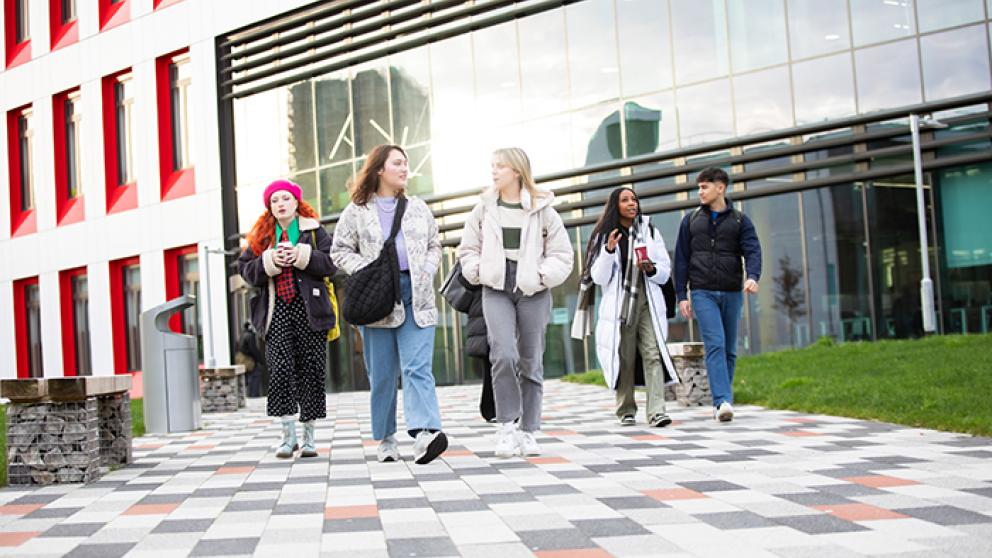
Wound Care Management Level 6 (20 credits)
Part-time
One semester
September 2026
In a nutshell
This single module will enable you to critically apply theory and practice in the management and care of patients in tissue viability.
You will:
- learn how to critically apply theory and practice in the management and care of patients in tissue viability
- be able to critically review and apply relevant concepts in care delivery
- be equipped to evaluate issues related to tissue viability
All about the course
Using key lectures, seminars and simulated skills sessions you will explore:
- Anatomy and physiology of the skin including stages and phases of wound healing, acute, and chronic wound healing.
- Holistic nursing assessment including wound bed preparation and evidence based frameworks, tools, and diagnostics investigations.
- History of wound healing and the impact it has had on current tissue viability practices.
- Principles of asepsis, wound cleansing techniques, wound infection diagnostics, and restoring wound bed bacterial balance.
- Wound assessment including wound aetiology, morphology, contamination, tissue type, etc.
- Interpretation of data in dressing choice and decision making processes.
- Exploration of the current evidence in pressure ulcer management in relation to pressure redistribution.
- Product selection – mattresses, beds, and chairs used in the 24 hour management of pressure ulcer prevention and management.
- Exploration of the political and social influences of wound care management.
- Evaluation of the professional, legal, and ethical issues of current wound care practice.
- The nurse’s role in the interdisciplinary wound management team, in providing holistic care for the patient requiring tissue viability management.
Please note that exact modules and content offered may vary in order to keep content current and, for courses that offer optional modules, may depend on the number of students selecting particular options. When accepting your offer of a place to study on a programme with optional modules, you should be aware that optional modules may not all run each year. Your tutor will be able to advise you as to the available options on or before the start of the programme. Whilst the University tries to ensure that you can undertake your preferred options, it cannot guarantee this.
School of Health and Society
The School of Health and Society is a forward-thinking, dynamic school with a commitment to lifelong learning and real world impact.
Our courses are informed by the latest research and we work closely with organisations from both the public and private sector to ensure our teaching is at the forefront of practice.
What about after uni?
Students who choose to study the Tissue Viability Module at Level 6 do so because they are either currently working or are considering a career as:
- a Tissue Viability Link Nurse
- a Tissue Viability Nurse Specialist
- a community nurse (adult, CYP, MH)
- a surgical nurse (adult, CYP)
- a nurse working on accident and emergency (adult, CYP, MH)
- a nurse working in level 3 and 4 critical care (adult, CYP)
- a nurse working with patient who regularly self-harm (adult, MH, CYP)
- A nurse advisor for a wound care/mattress/seating company
- Registered nurses who wish to set up a service in their locality, place of work i.e MH Wound Clinic, Nursing Home Lead Role.
- Podiatrists looking to expand wound care knowledge.
Career Links
The module links with industry partners from dressing, mattress, beds and seating.
Some students choose to evaluate a product from an industry partner as a case study for their poster presentation and then use this to attend Wounds UK Conference in November.
What you need to know
Potential students looking to enrol on the module should be registered nurses (adult, CYP, MH), healthcare professions (OT, Physiotherapy, Podiatry), medical staff, nurse/industry advisors.
Previous study and experience
Potential students looking to enroll on the module should be registered nurses (adult, CYP, MH), healthcare professions (OT, Physiotherapy, Podiatry), Medical staff, TAP’s, nurse/industry advisors.
You will need to demonstrate evidence of studying at level 5.
Accreditation for Prior Learning (APL)
We welcome applications from students who may not have formal/traditional entry criteria but who have relevant experience or the ability to pursue the course successfully.
The Accreditation of Prior Learning (APL) process could help you to make your work and life experience count. The APL process can be used for entry onto courses or to give you exemptions from parts of your course.
Two forms of APL may be used for entry: the Accreditation of Prior Certificated Learning (APCL) or the Accreditation of Prior Experiential Learning (APEL).
How much?
| Type of study | Year | Fees |
|---|---|---|
| Part-time | 2026/27 | £1,530 |
Additional costs
You should also consider further costs which may include books, stationery, printing, binding and general subsistence on trips and visits.
